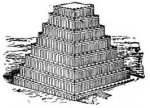M
Hi, have just been reading about the Tower of Babel, Gen 11 and the
commentator had the following to say. I thought it was a good reminder,
especially with the New Year fast approaching.
We build monuments to great moments and great people.
“Lest we forget” is etched on the bronze plates of more
than one statue. But monuments are more than just
memory aids; in building them we want, above all, to
glorify something. We want to honor a person or idealize
an event.
Shortly after the Flood, God made a covenant (or agreement)
with Noah and his descendants. But soon the people
forgot God, his goodness, his deliverance, his judgment,
and his promise. And they became impressed with themselves,
so much so that they decided to erect a monument
to themselves. They built their tower to glorify their greatness;
it became, instead, a memorial to their (and our) greatest
foolishness—human arrogance.We can learn several lessons in this passage:
(1) God is good and merciful to us.
(2) God is greater than we are.
(3) All humans are connected by sin.
The people in this story built the Tower of Babel for the
whole world to see (Genesis 11:3-4). This tower
was most likely a ziggurat, a common structure in
Babylonia at the time. Usually built as temples, ziggurats
looked like pyramids with steps or ramps leading up the
sides. Standing as high as three hundred feet and often
just as wide, a ziggurat would stand out as the focal
point of a city.
Today, people may not build statues, temples, or pyramids,
but they still erect monuments (achievements, expensive
clothes, big houses, fancy cars, important jobs) to call
attention to themselves. When used to give personal
identity and self-worth, these otherwise worthy pursuits
take God’s place. God gives us freedom to develop
in many areas, but not the freedom to replace him.
As you read, check out the attitudes of the builders in the
story, and consider any “towers” that you may be building.
Tear down anything that stands in God’s place.
commentator had the following to say. I thought it was a good reminder,
especially with the New Year fast approaching.
We build monuments to great moments and great people.
“Lest we forget” is etched on the bronze plates of more
than one statue. But monuments are more than just
memory aids; in building them we want, above all, to
glorify something. We want to honor a person or idealize
an event.
Shortly after the Flood, God made a covenant (or agreement)
with Noah and his descendants. But soon the people
forgot God, his goodness, his deliverance, his judgment,
and his promise. And they became impressed with themselves,
so much so that they decided to erect a monument
to themselves. They built their tower to glorify their greatness;
it became, instead, a memorial to their (and our) greatest
foolishness—human arrogance.We can learn several lessons in this passage:
(1) God is good and merciful to us.
(2) God is greater than we are.
(3) All humans are connected by sin.
The people in this story built the Tower of Babel for the
whole world to see (Genesis 11:3-4). This tower
was most likely a ziggurat, a common structure in
Babylonia at the time. Usually built as temples, ziggurats
looked like pyramids with steps or ramps leading up the
sides. Standing as high as three hundred feet and often
just as wide, a ziggurat would stand out as the focal
point of a city.
Today, people may not build statues, temples, or pyramids,
but they still erect monuments (achievements, expensive
clothes, big houses, fancy cars, important jobs) to call
attention to themselves. When used to give personal
identity and self-worth, these otherwise worthy pursuits
take God’s place. God gives us freedom to develop
in many areas, but not the freedom to replace him.
As you read, check out the attitudes of the builders in the
story, and consider any “towers” that you may be building.
Tear down anything that stands in God’s place.



